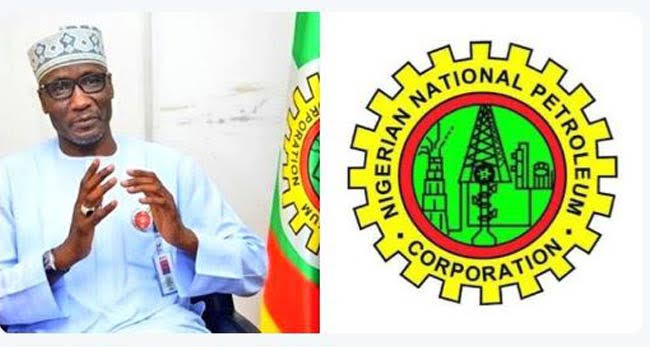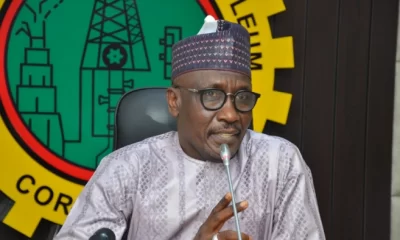Oil and Gas
NNPC Executives invite Newspaper Editors to hotel, for bribe to discredit report on incompetence, waste of resources

The top management of the Nigerian National Petroleum Corporation (NNPC) has invited newspaper editors to a Lagos hotel with the intention of bribing them to discredit a recent report about ineptitude, mismanagement and corruption in the state oil and gas company.
It was learnt that the planned meeting with the editors is scheduled for 1pm on Sunday at Legend Hotel, close to the Murtala Muhammed International Airport, Ikeja in Lagos.

A source privy to information regarding the emergency meeting told SaharaReporters that it is to bribe editors to discredit a report exposing the incompetence of NNPC executives and their wastefulness.
“They are inviting some editors to Legend Hotel in Lagos to bribe them to discredit a story published by the ICIR on Friday that really embarrassed them. The meeting is scheduled for 1pm on Sunday (today),” the source said.
The content of the text message sent out to the invited editors reads: “Meeting of selected editors scheduled for Sunday 12/9/2021 @ 1pm. Venue: Legend Hotel adjacent Murtala Muhammed International Airport. Please confirm, attendance.”
The report highlighted data collated from audited financial statements released by the NNPC, led by its Group Managing Director, Mele Kyari, on Wednesday. The report exposed how Port Harcourt Refinery Company (PHRC), which is managed by Ahmed Dikko, an engineer, reported no income in 2020 but incurred administrative expenses of N19.215 billion, paying salaries, wages and other benefits to unproductive workers to the tune of N22.55 billion.
Despite making zero revenue, Port Harcourt refinery employed 487 new workers and paid N23 billion as salaries in 2020.
We also learnt that the NNPC had already sponsored some groups to criticise the damaging report in an attempt to counter its implications by releasing press statements in the media.
For instance, a coalition of northern and southern groups recently released a joint statement saying the “continuous media attacks were designed to distract NNPC Group Managing Director and Port Harcourt Refinery Managing Director”.
The group said it took a stand during their second-quarter meeting in Kaduna at the weekend, “because the attack dogs of haters of the ongoing reforms at the NNPC are going beyond the boundaries of decency”.
“As Nigerian citizens, we feel duty-bound to draw public attention to a calculated, coordinated and well-funded media agenda designed to purposely distract the NNPC management, including another committed public servant – Dikko – who has been leading the reforms at the level of Port Harcourt refinery,” the group said.
The report on the 2020 financial statement of the company stated that the 487 new workers are being paid N3.93 billion annually, indicating that each of them takes an average of N8.072 million annually or N672,713 monthly.
The amount they earn monthly is about the annual salary of a normal Level 8 Federal Government worker.
Between 2019 and 2020, the refinery employed 1,162 new staff members, paying N41.163 billion in salary and wages, according to The ICIR’s calculations of the company’s wage data on its financial statements.
Also, out of the 487 staff members employed in 2020, 430 were senior and management staff members, amounting to 88.2 per cent, with huge financial implications. Only 57 were junior staff members.
Also, out of 675 staff engaged by the refinery in 2019, 656 were management and senior staff, members, representing 97 per cent of the total, with huge financial implications.
“It is looking like jobs for the boys at our dear refineries. And I wonder, most of these guys are earning heavy wages,” US-based Financial Consultant Ellam Ogochukwu said.
“Whoever is running that enterprise deserves to answer several questions,” she said.
Also, staff pension, gratuity and ‘long service award’ gulped N77.76 billion in 2020 as against N63.41 billion the previous year.
Surprisingly, under Dikko and his boss Kyari, the PHRC’s unproductive staff were allowed to take car loans, compassionate loans and advances valued at N1.001 billion in 2020.
The amount was N597.297 million in 2019.
In 2020, this refinery, which made no revenue, incurred a comprehensive loss of N53.179 billion.
In the previous year, the company made no revenue but incurred N50.530 billion in comprehensive loss.
Between 2017 and 2020, the company comprehensively lost N241.609 billion. Its revenue within this period was merely N6.27 billion.
“This refinery did not produce oil. What you have is that some people just iron their clothes, go to work and come back at the end of the day without adding to the productivity of the company,” Oil and Gas Analyst at Lagos-based Chapel Hill Denham Mustapha Wahab told The ICIR.
NNPC Managing Director, Kyari is the chairman of Port Harcourt refinery. He is followed by Ahmed Dikko (MD), Babatunde Sofowora (Executive Director of Services), Reginald Udeh (Executive Director, Finance and Accounts), James Ifeanyichukwu Ajibo (Executive Director, Operations), and Awaisu Muazu (late, served till July 2020).
These directors took N99.742 million as emoluments in 2020, a 67 per cent increase from N59.650 million they took in 2019.
In 2019, the Port Harcourt refinery did not record any revenue. Yet, it reported N25.19 billion in expenses.
Six directors collected N59.65 million in fees, meaning that each of them received an average payment of N9.94 million a month in 2019.
According to the NNPC, names of the six directors in 2019 were: Group Managing Director of NNPC, Malam Mele Kyari; Managing Director, Abba Bukar (who retired in March 2020); Executive Director of Services, Babatunde S. Sofowore; Executive Director of Operations, Ganiyu Abiodun Owolabi; another Executive Director of Operations, Engr Abel N. Imonighavwe; and Executive Director of Finance and Accounts, Mrs Aramide M. Ekundayo.
Salaries, wages, allowances, redundancy and pension costs gulped N22.195 billion. What that means is that, on average, each staff member received N32.88 million in 2019 from a company that made no revenue. This amounted, on the average, to N2.74 million each month.
Total salaries and pays received by staff members of Port Harcourt refinery between 2017 and 2019 amounted to N80.57 billion. But revenues received by the company within the period were estimated at N6.27 billion – implying that the NNPC sought N74.3 billion from outside the refinery to pay staff salaries.
Rather than privatise the refinery, the NNPC chose to pump an equivalent of 4.5 percent of Nigeria’s 2021 budget ($1.5 billion) into the refurbishment of a refinery that comprehensively lost N206.069 billion between 2017 and 2020.
Oil and Gas Analyst at Lagos-based Chapel Hill Denham, Mustapha Wahab said the investment in the refinery made no sense.
“Dangote refinery is coming on board and can process about 650,000 barrels per day of crude oil – highest in the world. NNPC has taken 20 per cent stake in Dangote.
“Why then are you resuscitating Port Harcourt refinery? We have done the analysis at Chapel Hill Denham and found that government should be spending $3billion or more to ensure efficiency of the refinery. So, it does not make investment sense because you are not going to compete with yourself,” he said.
“Two, Some countries are exiting low-carbon energy sources and migrating to clean energy. So, after rehabilitating Port Harcourt refinery, for how long will you enjoy its benefits, given that your market is not just Nigeria but also those countries exiting what you intend to sell to them?” he asked, urging the Nigerian Government to concession it for optimal benefits to the Nigerian economy.
Oil and Gas Governance Consultant, Henry Ademola Adigun also noted that the refinery was badly managed.
“The point is that the refineries are still badly managed. The faster the corporation becomes a limited liability company, the better,” Adigun said.
“You have a refinery not producing anything and not making revenues but salaries are being paid. How did the NNPC make the profit they said they made when the inefficiencies are there? The profit and loss do not show anything. They simply want to make it attractive to the stockman.”
He said there was no cost-cutting by the NNPC or the refineries, adding that there were also “no innovative efficiency, no restructuring or replanting and no cost-saving on salaries and wages.”
Former President of the Nigerian Society of Petroleum Engineers Joe Nwakwue said the only thing that the corporation could have done was to sell off the refineries.
“If you have a factory and is not producing, you will have to pay the gate man and the even the insurance company.”
The PHRC was commissioned in 1965. It was made up of two refineries: the old refinery was inaugurated in 1965 with capacity of 60,000 barrels per stream day (bpsd) and the new refinery was inaugurated in 1989 with an installed capacity of 150,000 bpsd, according to the NNPC.
It has a capacity of 210,000 bpsd with five process areas. In 2000, the then government of Nigeria shut down the refinery for turnaround maintenance. Other three refineries in the country were also expected to undergo a similar process, Oil & Gas Journal said.
As of that time, $364 million had already been spent on endless turnaround maintenance (TAM) services. About $25 billion has been spent on turnaround maintenance in the past 25 years, according to The Guardian.
The Institute for Global Energy Research, in a 2004 article, said the barrage of corruption, poor management, sabotage and lack of the mandatory turnaround maintenance (TAM) every two years had made all the refineries inefficient, making them operate at about 40 per cent of full capacity.
The NNPC said in April 2020 that it would hand over the four refineries in the country to a private firm to manage.
“We are going to get an O&M contract; NNPC won’t run it. We are going to get a firm that will guarantee that this plant would run for some time. We want to try a different model of getting this refinery to run. And we are going to apply this process for the running of the other two refineries.”
However, this has not happened. Rather, the corporation has sought money to rehabilitate the failed refineries.
It has prided itself on cost-cutting efficiency, but its refineries have incurred humongous losses.
Analysts say NNPC has no cause to hold onto the running of the refineries, having shown no capacity to manage it.
Source: SaharaReporters
























